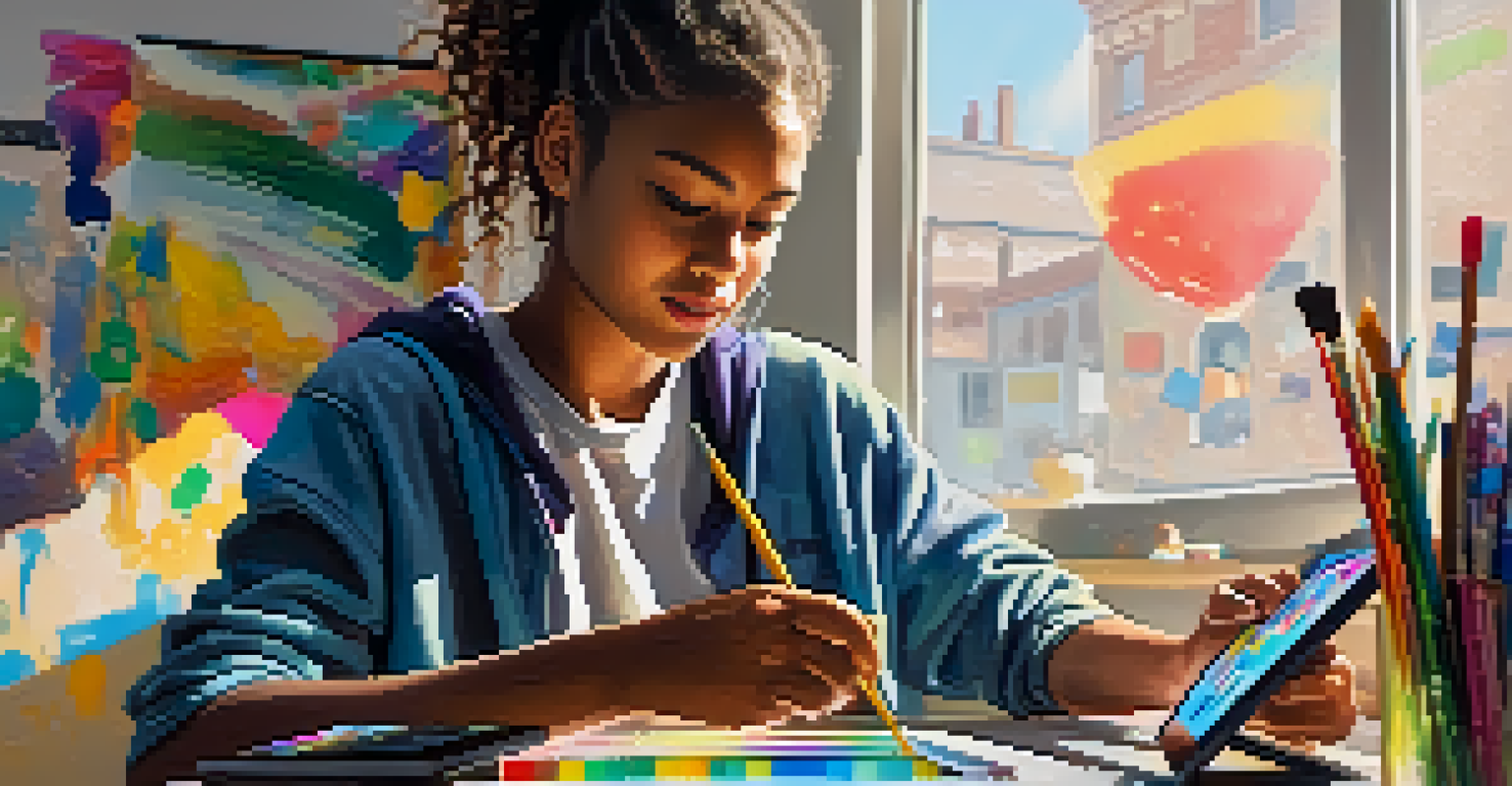The Impact of Social Media on Teenage Mental Health

Social Media Usage Among Teens: A Growing Trend
In today's digital age, social media has become a staple in the lives of teenagers. Platforms like Instagram, Snapchat, and TikTok have transformed how they communicate and connect with friends. With statistics showing that around 90% of teenagers are active on social media, it’s clear that these platforms are not just a passing trend but a significant part of their daily routines.
Social media is not just a tool for communication; it can also serve as a double-edged sword that impacts mental health in profound ways.
While social media offers opportunities for connection, it also brings forth challenges. Teens often find themselves navigating a virtual world filled with curated images and highlight reels of others' lives. This environment can lead to unrealistic comparisons, which may heighten feelings of inadequacy and anxiety among impressionable minds.
Additionally, the pressure to maintain an online presence can be overwhelming. Many teens feel they must constantly engage and showcase their lives to fit in, which can lead to stress and a fear of missing out (FOMO). As a result, understanding the balance between healthy engagement and overuse becomes essential.
The Positive Aspects of Social Media
Despite the potential downsides, social media can have positive effects on teenage mental health. For instance, it provides a platform for self-expression, allowing teens to showcase their creativity through art, music, and writing. This form of expression can be therapeutic, helping them process thoughts and emotions in a supportive environment.

Moreover, social media can foster a sense of community. Many teens find solace in online groups or forums where they can connect with peers who share similar interests or experiences. These connections can be particularly beneficial for those feeling isolated or misunderstood in their offline lives.
Social Media's Impact on Teens
Social media significantly influences teenagers' mental health, offering both opportunities for connection and challenges like anxiety and comparison.
Lastly, social media can serve as a valuable educational tool. Teens can access mental health resources, learn about coping strategies, and find information about mental health issues. This accessibility can empower them to seek help and support when they need it most.
The Negative Effects of Social Media on Mental Health
While social media has its benefits, it also poses significant risks to teenage mental health. Increased screen time is often linked to higher levels of anxiety and depression. As teenagers scroll through endless feeds, they may encounter negative comments, cyberbullying, or exclusion, all of which can contribute to a decline in self-esteem.
In a world where you can be anything, be kind. The digital space needs more empathy and understanding, especially among teens.
The phenomenon of 'social comparison' is another critical issue. When teens see their peers showcasing seemingly perfect lives, it can lead to feelings of jealousy and inadequacy. This comparison can be damaging, particularly if they struggle with their self-image or body confidence.
Additionally, the addictive nature of social media can disrupt daily routines. Many teens report spending excessive hours online, which can interfere with sleep, academic performance, and face-to-face relationships. Finding a balance between online and offline interactions is crucial for maintaining mental well-being.
Cyberbullying: A Growing Concern
Cyberbullying has emerged as one of the most troubling aspects of social media for teenagers. Unlike traditional bullying, cyberbullying can occur 24/7, reaching teens even in the supposed safety of their homes. This relentless nature can make it challenging for victims to escape the harassment, leading to severe emotional distress.
The anonymity provided by social media can embolden bullies, making it easier for them to target their victims without fear of repercussion. Many teens report feeling helpless and isolated, as they may be reluctant to share their experiences with adults due to fear of not being taken seriously or further victimization.
Risks of Cyberbullying
Cyberbullying presents a serious concern for teens, as it can occur relentlessly online, leading to emotional distress and isolation.
Addressing cyberbullying requires open communication between teens, parents, and educators. By fostering an environment where teens feel safe to discuss their experiences, we can work towards solutions that promote kindness and empathy in online interactions.
The Role of Parents in Monitoring Social Media Use
Parents play a crucial role in guiding their teens' social media usage. By initiating open conversations about online experiences, parents can help teens navigate the complexities of social media. Regular discussions can not only educate teens about the potential risks but also empower them to make informed choices.
Setting boundaries is another important aspect of parental involvement. Limiting screen time and encouraging breaks from social media can help teens foster healthier habits. Additionally, parents can model positive online behavior, demonstrating how to engage constructively with social media.
Moreover, being aware of the platforms their teens use can help parents better understand the challenges they face. By staying informed, parents can offer support and guidance, ensuring their teens enjoy the benefits of social media while minimizing the risks.
Promoting Healthy Social Media Habits
Encouraging healthy social media habits is essential for safeguarding teenage mental health. One effective strategy is to promote digital literacy, helping teens understand the impact of their online actions. Teaching them to think critically about the content they consume and share can empower them to navigate social media more responsibly.
Another approach is to encourage regular digital detoxes. Taking breaks from social media can help teens reset and reconnect with their offline lives. Engaging in hobbies, spending time with family, or participating in physical activities can provide a refreshing balance to their online presence.
Role of Parents in Guidance
Parents play a vital role in helping teens navigate social media by fostering open communication, setting boundaries, and promoting healthy habits.
Lastly, fostering a positive online community is vital. Encouraging teens to follow accounts that inspire and motivate them can create a more uplifting social media experience. By surrounding themselves with positivity, they can enhance their mental well-being and feel more connected to their peers.
The Path Forward: Finding Balance
As we continue to navigate the digital landscape, finding balance in social media use is paramount for teenagers. Recognizing both the benefits and risks allows teens to engage with these platforms more mindfully. Striving for a healthy relationship with social media can significantly impact their overall mental health.
It's essential for teens to remember that social media is just one aspect of their lives. Engaging in face-to-face interactions, pursuing hobbies, and spending time in nature can foster a more well-rounded lifestyle. By prioritizing these activities, they can cultivate a stronger sense of self beyond the online world.

In conclusion, while social media can influence teenage mental health in various ways, proactive measures can help mitigate the risks. By promoting open communication, healthy habits, and a balanced approach, we can support teens in navigating their digital experiences while prioritizing their mental well-being.